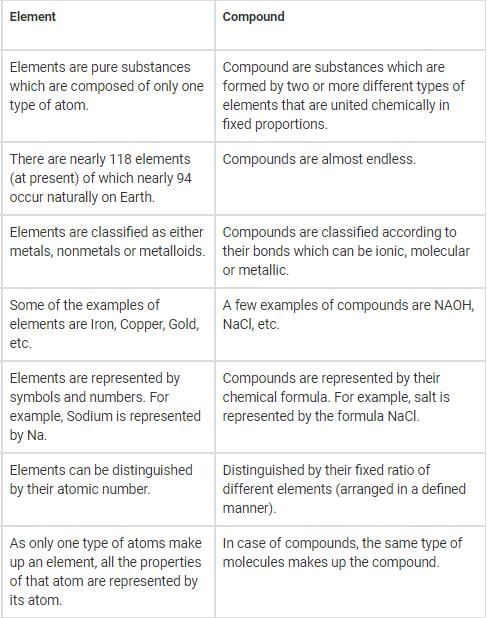Class 9 Exam > Class 9 Questions > difference bet. compound and element
Start Learning for Free
difference bet. compound and element
Verified Answer
difference bet. compound and element

 This question is part of UPSC exam. View all Class 9 courses
This question is part of UPSC exam. View all Class 9 courses
Most Upvoted Answer
difference bet. compound and element
Compound vs Element:
Definition:
- Compound: A compound is a substance formed by the chemical combination of two or more elements in definite proportions.
- Element: An element is a pure substance composed of only one type of atom.
Composition:
- Compound: Compounds are composed of two or more elements chemically bonded together. They can be broken down into simpler substances through chemical reactions.
- Element: Elements are made up of only one type of atom and cannot be broken down into simpler substances by chemical means.
Examples:
- Compound: Examples of compounds include water (H2O), sodium chloride (NaCl), and carbon dioxide (CO2).
- Element: Examples of elements include oxygen (O), gold (Au), and hydrogen (H).
Physical Properties:
- Compound: Compounds have unique physical and chemical properties that differ from the elements they are composed of.
- Element: Elements have distinct physical properties such as color, density, and melting point.
Chemical Properties:
- Compound: Compounds exhibit chemical properties that are different from the elements they are made of. They can form new substances through chemical reactions.
- Element: Elements have characteristic chemical properties that determine how they react with other substances.
Representation:
- Compound: Compounds are represented by chemical formulas that show the types and ratios of elements present in the compound.
- Element: Elements are represented by symbols from the periodic table that indicate the type of atom present.
In conclusion, compounds are composed of two or more elements chemically bonded together, while elements are pure substances made up of only one type of atom. Their composition, properties, and representation distinguish compounds from elements in the realm of chemistry.
Definition:
- Compound: A compound is a substance formed by the chemical combination of two or more elements in definite proportions.
- Element: An element is a pure substance composed of only one type of atom.
Composition:
- Compound: Compounds are composed of two or more elements chemically bonded together. They can be broken down into simpler substances through chemical reactions.
- Element: Elements are made up of only one type of atom and cannot be broken down into simpler substances by chemical means.
Examples:
- Compound: Examples of compounds include water (H2O), sodium chloride (NaCl), and carbon dioxide (CO2).
- Element: Examples of elements include oxygen (O), gold (Au), and hydrogen (H).
Physical Properties:
- Compound: Compounds have unique physical and chemical properties that differ from the elements they are composed of.
- Element: Elements have distinct physical properties such as color, density, and melting point.
Chemical Properties:
- Compound: Compounds exhibit chemical properties that are different from the elements they are made of. They can form new substances through chemical reactions.
- Element: Elements have characteristic chemical properties that determine how they react with other substances.
Representation:
- Compound: Compounds are represented by chemical formulas that show the types and ratios of elements present in the compound.
- Element: Elements are represented by symbols from the periodic table that indicate the type of atom present.
In conclusion, compounds are composed of two or more elements chemically bonded together, while elements are pure substances made up of only one type of atom. Their composition, properties, and representation distinguish compounds from elements in the realm of chemistry.

|
Explore Courses for Class 9 exam
|

|
Similar Class 9 Doubts
difference bet. compound and element
Question Description
difference bet. compound and element for Class 9 2025 is part of Class 9 preparation. The Question and answers have been prepared according to the Class 9 exam syllabus. Information about difference bet. compound and element covers all topics & solutions for Class 9 2025 Exam. Find important definitions, questions, meanings, examples, exercises and tests below for difference bet. compound and element.
difference bet. compound and element for Class 9 2025 is part of Class 9 preparation. The Question and answers have been prepared according to the Class 9 exam syllabus. Information about difference bet. compound and element covers all topics & solutions for Class 9 2025 Exam. Find important definitions, questions, meanings, examples, exercises and tests below for difference bet. compound and element.
Solutions for difference bet. compound and element in English & in Hindi are available as part of our courses for Class 9.
Download more important topics, notes, lectures and mock test series for Class 9 Exam by signing up for free.
Here you can find the meaning of difference bet. compound and element defined & explained in the simplest way possible. Besides giving the explanation of
difference bet. compound and element, a detailed solution for difference bet. compound and element has been provided alongside types of difference bet. compound and element theory, EduRev gives you an
ample number of questions to practice difference bet. compound and element tests, examples and also practice Class 9 tests.

|
Explore Courses for Class 9 exam
|

|
Signup for Free!
Signup to see your scores go up within 7 days! Learn & Practice with 1000+ FREE Notes, Videos & Tests.
























